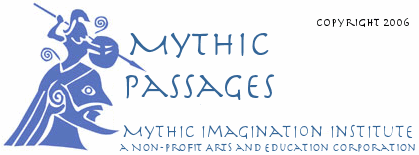
|
Surrender:
May You Know the Right
Questions to Ask
by Michael Karlin
Co-President - Mythic Imagination Institute
|
 |
We go through life thinking we have it all figured out, or at least that we
should. Certainly everyone else has it figured out, so why shouldn't I? This
common and simplistic notion is reinforced thousands of times every day in the
media and other forms of popular culture where life is portrayed as easy,
success and happiness an entitlement. We are supposed to have all of the
answers, and to ask for help, to ask questions is a sign of weakness.
The irony is that all of the major spiritual traditions teach that the farther
along the spiritual path you travel, the more humility you attain, and the
greater your ability to surrender to God. There are two stories about Moses,
the Biblical leader of the Jews, that portray this humility. The first is from
the Passover Haggada, the story of the Jewish Exodus from Egypt that is read
every year during the festival of Passover. The primary Biblical commandment
regarding Passover is that parents must teach the story of the Exodus to their
children every year. At the time this commandment was issued, all of the Jewish
children had lived in Egypt and actually experienced the Exodus first hand.
All, that is, except for Moses' children who were still back in Midian with
Tzipporah, Moses' wife. So, Moses was the first parent who actually had to
teach his children about the Exodus. According to tradition, the story he told
them became the basis for the Passover Haggada, which is used to tell this
story even today. The remarkable thing about the Haggada is that Moses' name is
not mentioned even once. This sages attribute this glaring omission to the
incredible humility that Moses possessed. According to this tradition, Moses
attributes the Exodus to God, and not to himself. He will not take any credit
for his role in the events.
The second story is from the Torah itself. The opening word of the book of
Leviticus is vayikra, "and He called." The strange thing about this word is
that in the actual written Hebrew in the Torah scrolls the final letter, an
aleph, is written much smaller than the other letters. When the Rabbis of the
Talmud (the Jewish Oral Tradition) were debating why this letter was written
this way, they attributed it to the humility of the Torah's draftsman, Moses.
Vayikra means "and He called," but its connotation is loving and intimate. You
would use this term when calling to someone beloved to you. The term vayikar,
spelled the same as vayikra, but without the final aleph, means "and He called"
also, but the connotation is of distance and apathy. Almost as if you just
bumped into someone. The way the story goes, as Moses was transcribing the
Torah as God was dictating it, they came upon this section where God told Moses
to write vayikra. Feeling as if this would overstate the level of intimacy and
respect that God had for Moses, he pleaded with God to let him write vayikar
instead. Moses would not give in, and ultimately, they settled on a compromise:
Moses would write the aleph very small, so someone who is reading through the
text quickly would read it vayikar, and only those who were studying it
carefully would actually read it as it was intended, vayikra. This was the
extent to which he practiced his humility and surrender.
These two stories, from just one tradition, illustrate the point that the
ultimate examples of piety and spiritual enlightenment in all traditions
display the greatest level of humility and surrender.
I am continually trying to learn and re-learn this lesson in my own life, and
it is no different as I have been on my path towards this year's Mythic
Journeys. I often felt like we had all of the answers. We could see our path
unfolding in front of us, and we knew just what to do to get there. Fortunately
and unfortunately, depending upon your perspective, we have been reminded time
and time again that we do not know what is intended of us, where we are going,
or what the answers are. And that is okay, because what is actually unfolding
is much more beautiful, meaningful, and impactful than anything we could have
imagined going into it. It has not been an easy journey, nor will it be going
forward. And we certainly do not have all of the answers. We are trying to
learn that it might be enough to try and figure out what the right questions
are.
In many ways the spiritual path is about surrender, and surrendering is about
not knowing the right path, not knowing the right answers. Not knowing means we
have to have the humility and the wisdom to ask questions. Even then, we too
often do not even know the right questions to ask. Perhaps the ultimate prayer
is to pray for the wisdom to know the right questions.
This year's Mythic Journeys will focus on asking questions in community.
Sharing guidance and wisdom with each other, in humility, to find the right
questions, and then perhaps, to begin to uncover some of the answers, or at
least a few more bread crumbs along the path. This is my prayer for our
attendees this year. I hope you can join us.
Peace,
Michael
Return to
Passages Menu
Subscribe to the Passages
e-zine
|
